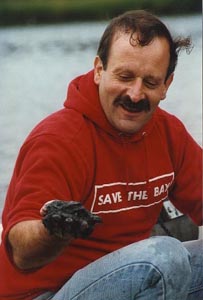
It is fitting to name Mark D. Gould among the distinguished naturalists of Rhode Island. The award is based on outstanding contributions made in teaching, or in advancing scientific knowledge, or in enhancing public awareness of the state’s ecosystems. Mark Gould excelled not in one of these areas, but in them all.
Born in Washington, D.C., Mark grew up in Newport, Rhode Island and settled as an adult in South County. After receiving his Ph.D. from the University of Rhode Island, he began his career at Roger Williams University in 1973. In his twenty-six years there, Mark was instrumental in the growth of the marine biology program and expansion of science facilities. He served as Division Coordinator of the Natural Sciences from 1978 to 1990, Dean of the School of Science and Mathematics from 1990 to 1994, and Dean of the College of Arts and Science from 1994 to 1997. In 1997, Mark became the first Director of the University’s Center for Economic and Environmental Development, which he helped to envision and realize. He was in his second year as Director at the time of his death.
As a teacher of invertebrate zoology and advanced ecology courses, Mark was gifted, challenging, and enthusiastic, inspiring his students with his rigorous logic, whimsical humor, and constant support. Roger Williams students awarded Mark “Teacher of the Year” in 1985, 1986, 1987, and 1988. His students honored him because Mark honored them; one alumnus said of Mark, “Without his mentorship and guidance, I wouldn’t be where I am now in my career. He gave me the chance that eventually changed my life around.”
Mark’s research and publications show the balance he’d found in his career, using science to inform and assist real world problem-solving. The state is richer for having Mark’s long-term monitoring of Rhode Island freshwater benthic macroinvertebrates throughout the 1990s, as well as his establishing and field testing a rapid bioassessment screening for these organisms. This area of his expertise is characteristic of Mark: careful not to overlook the importance of small creatures hidden in the mud. His collaboration on a curriculum for teaching science to fifth graders illustrates this point: Mark felt that macroinvertebrates were the perfect mechanism to reach the students. For adults, he authored a standardized biological monitoring manual for citizens’ volunteer monitoring groups, again showing how science can help non-scientists take care of their ecosystem.
Mark did not keep his love for and understanding of the natural world to himself. He shared it at every opportunity, which is why his name appears on the membership list of virtually every environmental organization in the state. Mark was a founder of the Rhode Island Natural History Survey, and board members from RINHS, Save the Bay, Narragansett Bay National Estuarine Research Reserve, and the Wood-Pawcatuck Watershed Association miss his energy and his wisdom.